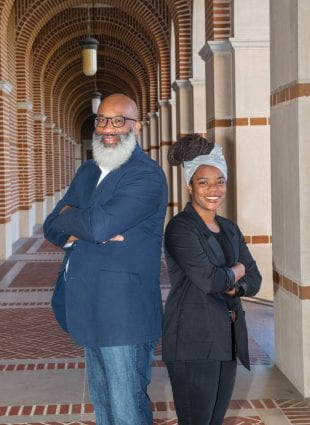HOUSTON – (March 18, 2020) – Working blacks who believe racism has a major impact on their lives are more likely to seek self-employment than those who feel less strongly about its effects, according to new research from Rice University.
"Belief in Systemic Racism and Self-Employment Status among Working Blacks" will appear in an upcoming volume of Ethnic and Racial Studies. Rice researchers Asia Bento, a sociology graduate student, and Tony Brown, a professor of sociology, analyzed data from 600 black respondents to the 2012 Outlook on Life Surveys for the research.
"Many people think self-employment can be a road to success," Brown said. "There are many, many stories told about people who are self-employed and 'do very well.' But we found ourselves wondering what role racism plays in a black person's decision to become self-employed."
Bento and Brown found that working black adults with "racial capital," or high awareness of the systemic nature of racism, were seven times more likely to pursue self-employment than those with low awareness.
"We feel that these individuals might seek self-employment to evade racism or at least minimize its influence on their careers," Bento said.
But the researchers were quick to note that self-employment did not necessarily translate into great financial success. In fact, they found self-employed black survey respondents were generally in worse financial situations than those working for somebody else. Those self-employed respondents were also less likely to have a college education.
The researchers said the survey responses suggest people might change jobs or make other financial decisions based on their belief in "how the world works" — in other words, that racism is intertwined with capitalism and unavoidable in a traditional workplace.
"Self-employed or not, racism still undermines their career and financial success," Bento said.
The researchers hope their study will encourage future work examining racial capital among other groups, including Latinos and black immigrants.
The paper is available online at https://www.tandfonline.com/doi/full/10.1080/01419870.2020.1737170.
-30-
This news release can be found online at news.rice.edu.
Follow Rice News and Media Relations on Twitter @RiceUNews.
Article link: https://www.tandfonline.com/doi/full/10.1080/01419870.2020.1737170
Photo link: https://cpb-us-e1.wpmucdn.com/news-network.rice.edu/dist/c/2/files/2020/03/191218_RARE_Groups_Tony_Brown-0018.jpg
Photo credit: Submitted photo.
Located on a 300-acre forested campus in Houston, Rice University is consistently ranked among the nation’s top 20 universities by U.S. News & World Report. Rice has highly respected schools of Architecture, Business, Continuing Studies, Engineering, Humanities, Music, Natural Sciences and Social Sciences and is home to the Baker Institute for Public Policy. With 3,962 undergraduates and 3,027 graduate students, Rice’s undergraduate student-to-faculty ratio is just under 6-to-1. Its residential college system builds close-knit communities and lifelong friendships, just one reason why Rice is ranked No. 1 for lots of race/class interaction and No. 4 for quality of life by the Princeton Review. Rice is also rated as a best value among private universities by Kiplinger’s Personal Finance.


